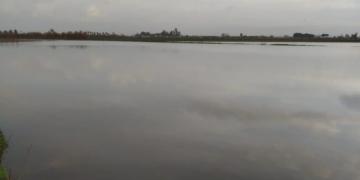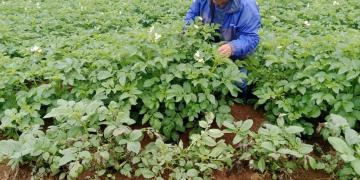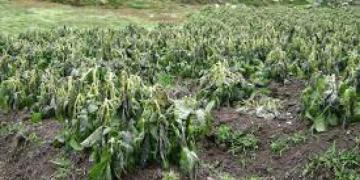Germany: Potatoes rot in the fields of Lower Saxony
Despite, or perhaps because of, a record harvest, the potato crisis has arrived. Potatoes are rotting in Lower Saxony’s fields – and the problem is largely self-inflicted.

It’s arguably the most quintessentially German vegetable found in the fields. But despite being Germany’s favorite, the potato is in crisis: on many fields in Lower Saxony, the potatoes haven’t yet been harvested – and will likely never reach the market or even be eaten. This unfortunate treatment of the humble potato has various causes – and the crisis is partly "homegrown," explain farmers’ associations.
Despite, or perhaps because of, a record harvest, the potato crisis has arrived. Potatoes are rotting in Lower Saxony’s fields – and the problem is largely self-inflicted. © Imago/Martin WagnerThe German potato industry has an absurd problem: there are too many tubers. This oversupply has caused prices to plummet. In some cases, the drop is so severe that harvesting is no longer profitable for some farmers, and some tubers are simply rotting in the fields. "The harvest costs more than it brings in," Thorsten Riggert, a farmer from the Uelzen district and board member of the Union of German Potato Producers (UNIKA), told IPPEN.MEDIA on Monday (October 27). "And this problem is, to some extent, even a self-inflicted one on the part of agriculture."
Potatoes are rotting in the fields of Lower Saxony – the problem is partly “homemade”
Last year, the situation was relatively dire because the yield per hectare was low, prices were correspondingly good, and this saved the market: "But this year, with more than 13.4 million tons, the potato harvest was the largest in 25 years – this record has resulted in a surplus and rapidly falling prices on the market." This is hitting farmers in Lower Saxony, the most important potato-growing region in Germany, particularly hard.
Riggert, who is also chairman of the Northeast Lower Saxony Farmers’ Association in the Uelzen district, reports: "For at least two years we have been urging that the potato cultivation area must be reduced." But instead, the area increased by 5 percent last year, and by another 7.5 percent in 2025.
Extreme weather in Lower Saxony: The most impressive pictures
Stefanie Sabet, Secretary General of the German Farmers’ Association, adds: "With normal weather conditions, the expansion of the German cultivated area would have been manageable for the market." However, due to the very good growing conditions in many European growing regions this year, there has been a significant oversupply.
Potato crisis in Lower Saxony: Record harvest, potato prices at rock bottom
The potato surplus is proving costly for farmers: Many who expanded their acreage after last year’s high prices are now left empty-handed: "These were all bad decisions," says Riggert. Nevertheless, individual farms cannot be blamed: "The switch to corn, sugar beets, and grain cultivation, which is an even bigger disaster, is often due to farm desperation."
Many of the potatoes that didn’t find buyers are now being used for so-called alternative purposes: "Leaving the tubers in the ground over the winter makes little sense from a field hygiene perspective," says the farmer from Uelzen. He expects that most of the remaining potatoes will end up in biogas plants or be used as animal feed, "for negligible prices."
The only solution for the coming years is to no longer cultivate so-called free goods beyond the cultivation already secured by contracts.
Fuente: kreiszeitung.de




